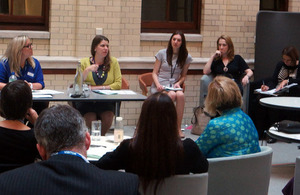UK government hosts first international body image conference
Leading experts from around the world meet to help drive forward change.

Minister for Women and Equalities Jo Swinson, hosted the first international conference yesterday (30 September) with leading experts from around the globe to discuss the current state of the existing evidence on body image.
The event was co-hosted by Dr Phillippa Diedrichs, from the Centre for Appearance Research, University of the West of England.
In May the Government published a rapid evidence review into the existing research on body image. The conference aims to build on this review, our understanding of the evidence, and to identify any gaps in knowledge. The findings and the expertise of the academics attending yesterday’s event will help drive forward the UK government’s thinking on the future direction of work in this area.
Speaking at the conference Jo Swinson said:
In the UK and around the world, men and women are subject to a daily bombardment of images of beauty “ideals” and messages about what they should look like. The sheer volume of those images, the impossibility of escaping them and the constant cultural pressure for bodily perfection can damage self-esteem.
Low body confidence has become one of the major threats against health and wellbeing. It can stop young women from being physically active and drives unhealthy eating behaviours and young men are increasingly misusing steroids for cosmetic reasons.
The government’s Body Confidence campaign works with the media, advertising, retail and fashion industries to encourage more diverse and realistic representation of human bodies. Progress is being made but much more needs to be done. That’s why I have brought together leading experts from around the world so we can build on what we know already, open up the debate and identify solutions to create the cultural change we need.
New research reports
Fourteen leading experts from a range of academic disciplines, from as far afield as Canada, the US and Australia met yesterday to discuss and debate a range of specially commissioned research papers that add to the recent rapid evidence review.
Psychology by Professor Susan Paxton from La Trobe University, Australia argues that governments need to demonstrate leadership in conveying the importance of body image issues and in providing practical support for the implementation of effective solutions. Susan cites examples from the Australian government’s voluntary industry code of conduct on body image and the Voluntary Quebec Charter for a Healthy and Diverse Body Image, both launched in 2009.
Cultural studies by Dr Sarah Riley from Aberystwyth University presented evidence that body image is a dynamic process, part of a social conversation that constructs body size as an individual responsibility, and which conflates weight and appearance with health and morality. Sarah argue that interventions should target the social nature of body image problems and develop collective resistance to negative messages.
Public health by Professor Dianne Neumark-Sztainer from the University of Minnesota, USA, argues that body image is critical in preventing eating disorders and weight problems, and an important public health concern in its own right. Dianne suggests that health promotion should tackle weight-related bias and shaming, and that efforts to tackle obesity should specifically address body image. Healthcare professionals should be trained to promote body satisfaction and schools should address body image within anti-bullying. School-based health curriculum should include content aimed at promoting a positive body image to prevent both eating disorders and obesity.
Business and economics by Dr Ben Barry from Ryerson University, Toronto argues that consumers want advertising messages and retail experiences that support positive body image and they reward business that do so. Public policy should encourage and nurture young entrepeneurs – in partnership with industry, education and the third sector – to develop organisations with offerings and marketing messages that champion body confidence. Policy should engage business, fashion and retail departments in colleges to develop curriculum that explores the relationship between body image and consumption.